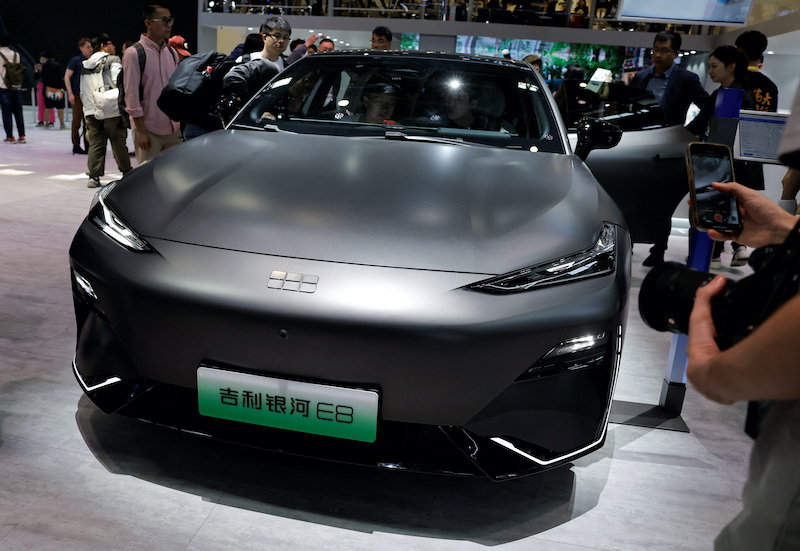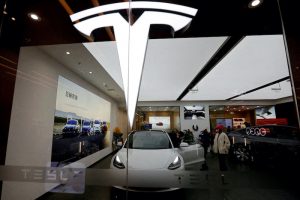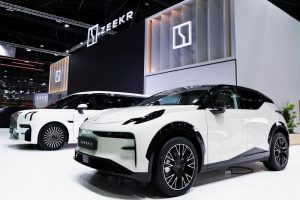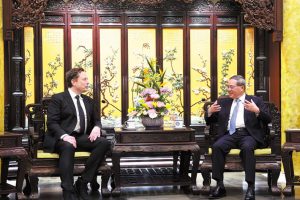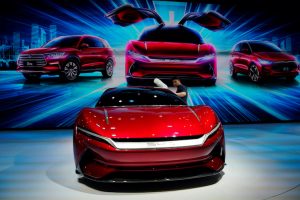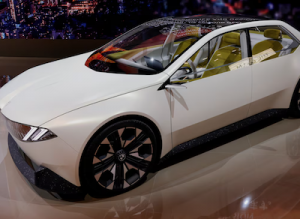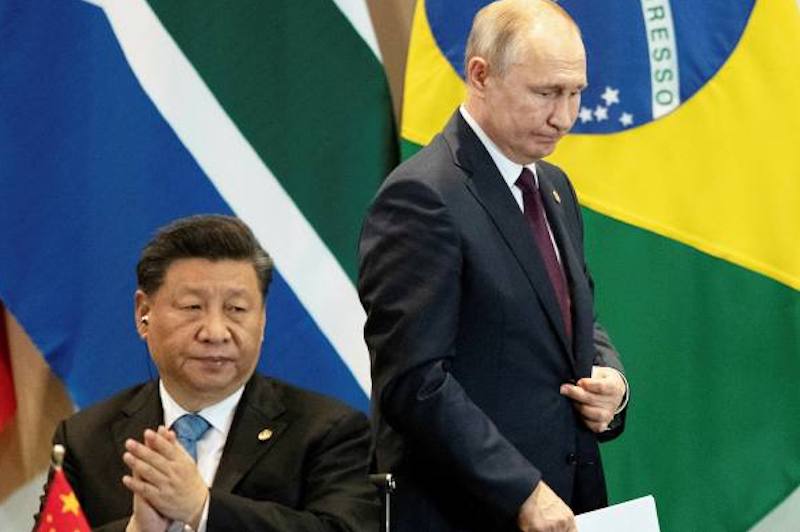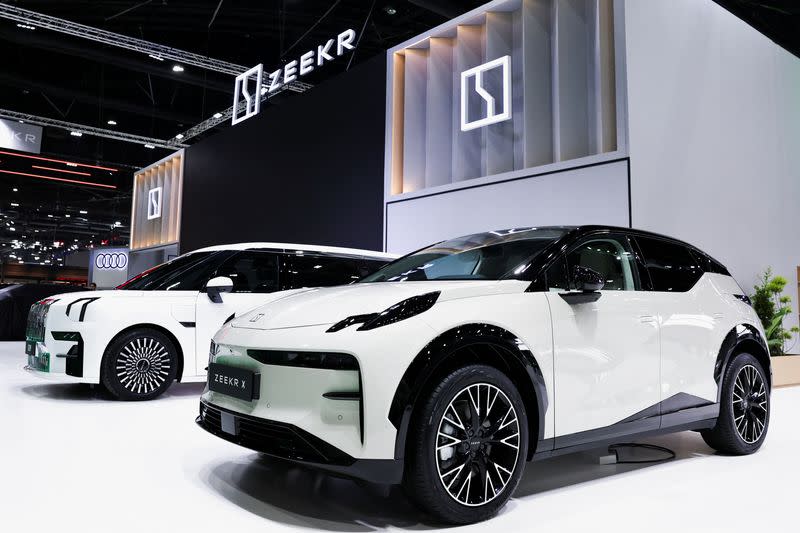After months of reports that “the era of foreign carmakers is over“, it is hardly surprising that Chinese carmakers would dominate at the country’s biggest auto show.
The auto show, which opened on Thursday, formally known as the 2024 Beijing International Automotive Exhibition, showcases the latest creations of China’s top carmakers.
Some 117 new models were due to be unveiled at the event – out of 278 new energy vehicles that are on display, organisers said. And the mindset is, of course, all-electric.
ALSO SEE: Tesla Profit Plunges, But Stock Jumps on Vow of ‘Affordable’ Cars
This event, which runs through till early May, comes as NEV sales hit a milestone in early April, accounting for over half of all cars sold in China, auto association data showed.
Sales have been getting a boost from a year-long price war that has sapped profit margins, as automakers strive to keep up by announcing newer, cheaper models and promotions.
“At the Beijing auto show, there’s no doubt there is no interest in gasoline vehicles anymore. Everyone is looking for the latest technologies in intelligence and electrification,” William Li, founder and CEO of Chinese EV maker Nio, said.
“If you come here, you should have no doubt about EVs anymore. It is actually not the future but is what’s happening right now.”
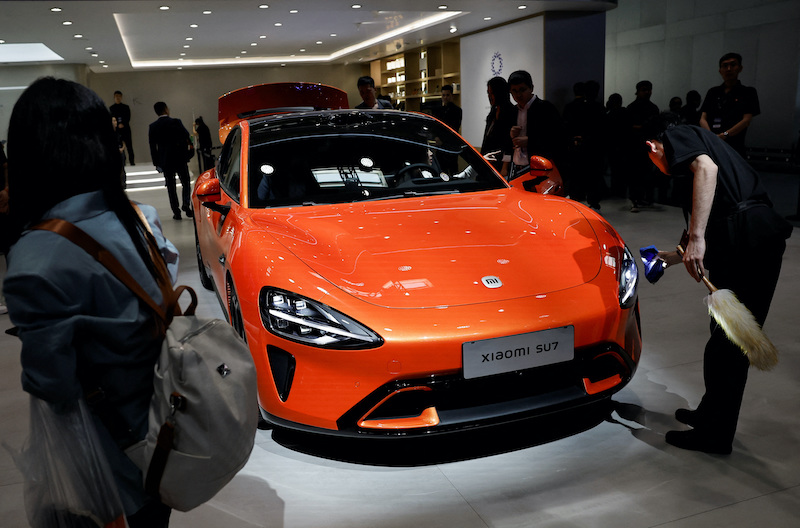
Orders for Xiaomi SU7 top 75,000, CEO says
Crowds flooded the booths of Chinese manufacturers such as BYD and industry newcomer Xiaomi, with the smartphone maker stealing the show by holding one of the earliest press events.
Xiaomi CEO Lei Jun said locked-in orders for its sporty SU7 sedan had hit 75,723 and that buyers included owners of cars from the likes of BMW and Audi. The group aims to deliver over 10,000 units in June, which he said would be a record for an EV startup.
The locked-in orders, which refer to those where buyers have opted for non-refundable deposits, have come less than one month into the launch of Xiaomi’s first car in late March.
Xiaomi targets more than 100,000 deliveries for the SU7 in 2024 and intends to keep its automotive business “100% focused” on the Chinese market for the next three years, Lei had said at an investor conference on Tuesday.
The debut of the SU7, which draws styling cues from Porsche and undercuts Tesla’s Model 3 on pricing, adds fuel to a blazing EV price war in the world’s largest auto market, with automakers with comparable models announcing price cuts and subsidies after the SU7’s launch.
Xiaomi’s auto team of 6,000 people is far from enough, Lei said at Thursday’s briefing, inviting global talent to join the company’s car-making ambition.
BYD promoting its top brands
BYD, the world’s largest EV maker, heavily promoted its Yangwang and Denza premium brands as it tries to shed its image as a low-cost automaker.
It also announced the Ocean-M, a sporty rear-wheel-drive hatchback priced 150,000 to 200,000 yuan ($20,699 to $27,598) that will be the first vehicle built on a new all-electric platform. The mid-sized car targets China’s middle class and sells far below the price of mainstream EVs in North America and Europe.
Foreign automakers, who have been scrambling to reset their China strategies and catch up with the electric shift, touted plans to invest more in local production and research, with Japan’s Nissan Motor and Mazda Motor unveiling cars tailored for Chinese drivers.
US automaker General Motors left traditional engine vehicles out of its show line-up for the first time, while Germany’s Mercedes Benz dismissed rumours it was giving up on electrification as it showed a handful of new EVs.
Tesla skipped the show again. Its last appearance was in 2021 when an unhappy customer clambered atop a Tesla being displayed to protest its handling of her complaints about brakes she said were malfunctioning.
Some Chinese brands outlined overseas plans, brushing off European and US concerns about industry overcapacity and stressed they had simply become better through innovation.
“With the Chinese automotive industry entering a new era of globalisation and the growing strength of Chinese domestic brands, Chinese vehicles moving onto the world stage has also become a new trend,” Great Wall Motor president Mu Feng said.
‘Smart’ driving
Domestically designed advanced driving assistance systems similar to Tesla’s Full Self-Driving (FSD) were also marketed by several automakers as key selling points.
A number of firms, such as Seres and Guangzhou Automobile Group (GAC), which markets China’s third-best-selling EV brand, touted systems supplied by Huawei Technologies whereas others like BYD and XPeng promoted features developed in-house.
BYD said it would launch two revamped models in its mass market Dynasty and Ocean series in the second quarter equipped with its self-developed advanced driving assistance system (ADAS), while XPeng said it would continuously upgrade software at a “super fast” pace to keep it ahead of rivals.
GAC said it would launch flagship models equipped with Huawei’s ADAS from January 2025. It is among seven brands of state-owned automakers that struck partnerships with Huawei to leverage the latter’s ADAS technology.
“Huawei is leading in advanced assistance driving capabilities,” GAC general manager Feng Xingya said. “We have to make sure the GAC products consumers get are most advanced in those technologies.”
- Reuters with additional editing by Jim Pollard




